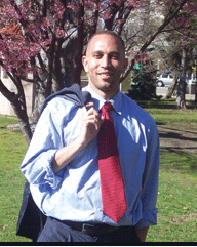 Hakeem Jeffries, a candidate for the open 57th Assembly District seat, is against the use of eminent domain to build a basketball arena, as he said in an advertisement in May and at a forum last Thursday.
Hakeem Jeffries, a candidate for the open 57th Assembly District seat, is against the use of eminent domain to build a basketball arena, as he said in an advertisement in May and at a forum last Thursday.But what exactly does that mean? I caught up with Jeffries after the forum to ask him to amplify his statement. That produced some musings, but no definitive statement.
“I’m opposed to using eminent domain as it relates to this project,” he said. “I don’t believe it should be used by a private developer to build a basketball arena.”
“I've encouraged, from the very beginning, the notion of looking at a project that focused exclusively on housing, or focused predominantly on housing," he continued. "I’ve yet to see the connection made with the necessity of the arena and tying it to making the development of affordable housing economically feasible. I'd be interested in seeing that argument made, but until it's made I can't really comment any further on the issue of how eminent domain relates to the entire project."
Eminent domain for what?
“What’s important to have happen is to see whether the developer can make the case that there's an absolute and explicit and necessary connection between an arena and the housing,” he said. "The eminent domain, in my understanding, is what's necessary as a result of the arena, not as a result of building the housing along the railyards."
I suggested that eminent domain would be used for both the arena and housing. "That's something I would be interested in looking at, but I've got to see that information," Jeffries said.
(Indeed, the housing would be built not only on the railyards between Pacific Street and Atlantic Avenue, but also between Pacific and Dean streets. Some properties on yet unsold to Forest City Ratner would be in the arena location, while others would be in areas slated for housing. Negotiations are ongoing, so it's unclear which properties would be subject to eminent domain other than the condo owned by Daniel Goldstein of Develop Don't Destroy Brooklyn, who has stated his unwillingness to sell; it would be located within the arena segment.)
Broader impact
I pointed out that part of the subsidies for the arena would go to infrastructure that could support the larger project. "The case that an arena is going to be an economic benefit to the community is one that's very suspect," Jeffries said. I noted that that the Independent Budget Office predicted a modest fiscal gain.
Jeffries added: "To me, the case to be made and the common ground here, even if you look at the UNITY plan project that was supported by others, would be the affordable housing. Everyone agrees that what should be built there is some housing, and some housing that deals with the affordable housing crisis. And we should all be looking at finding the common ground, as opposed to the issues that are dividing us."
If he were in the state legislature today, I asked, what would he tell Assembly Speaker Sheldon Silver, who controls a key vote on the Public Authorities Control Board, which must approve the project after the ESDC votes.
"As a lawyer, I've learned never to answer hypothetical questions," Jeffries responded. Pressed by the Times earlier this month for his stand, Jeffries said that he would "be more inclined to support it than not," mainly because of the affordable housing.
What remains unclear in the discussion about affordable housing in the Atlantic Yards plan is the value of the public subsidies.
Comments
Post a Comment